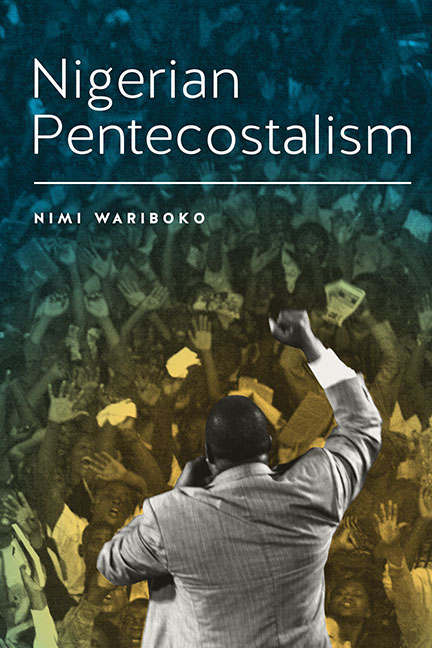Book contents
- Frontmatter
- Dedication
- Contents
- Foreword
- Preface
- Acknowledgments
- Introduction
- Part 1 Origins and Spirituality of Nigerian Pentecostalism
- Part 2 Ethical Vision of Nigerian Pentecostal Spirituality
- 6 Politics: Between Ontology and Spiritual Warfare
- 7 Miracles, Sovereignty, and Community
- 8 Altersovereignty and Virtue of Pentecostal Friendship
- 9 Spirituality and the Weight of Blackness
- 10 “This Neighbor Cannot Be Loved!”: Invisibility and Nudity of the “Pentecostal Other”
- 11 Pentecostalism and Nigerian Society
- Notes
- Bibliography
- Index
8 - Altersovereignty and Virtue of Pentecostal Friendship
from Part 2 - Ethical Vision of Nigerian Pentecostal Spirituality
Published online by Cambridge University Press: 15 March 2018
- Frontmatter
- Dedication
- Contents
- Foreword
- Preface
- Acknowledgments
- Introduction
- Part 1 Origins and Spirituality of Nigerian Pentecostalism
- Part 2 Ethical Vision of Nigerian Pentecostal Spirituality
- 6 Politics: Between Ontology and Spiritual Warfare
- 7 Miracles, Sovereignty, and Community
- 8 Altersovereignty and Virtue of Pentecostal Friendship
- 9 Spirituality and the Weight of Blackness
- 10 “This Neighbor Cannot Be Loved!”: Invisibility and Nudity of the “Pentecostal Other”
- 11 Pentecostalism and Nigerian Society
- Notes
- Bibliography
- Index
Summary
Sovereignty after Babel or sovereignty after Pentecost? Your choice depends on whether you think diverse Pentecostal dispositions to or flights from authority are incommensurable or translatable.
Introduction
This chapter discusses the connection between an alternative notion of sovereignty (altersoveriengty) and the virtue of friendship as a building block of such a form of soveriegnty. Sovereignty is a great subject of philosophical reflection in political science and political philosophy. But in Pentecostal philosophy or theology, it has not emerged as a subject worthy of inquiry. When at a recent Pentecostal academic conference I mentioned sovereignty, many of the scholars immediately thought I meant the sovereignty of God. As we saw in the previous chapter, the scholarship of Ruth Marshall has been instrumental in directing the attention of political scientists, philosophers, and Christian theologians to the implications of the Pentecostal faith and practices for the subject of political sovereignty.
Marshall argues that there is little or no chance for Nigerian Pentecostalism to bring its disparate sets of believers to found and sustain a genuine community of believers who can be mobilized for social or political programs. Her point is based on observations that the Pentecostal movement is too fractionalized, is excessively oriented to miracles, and carries a genetic disavowal of any form of sovereignty that can hold together the sprawling congeries of individualistic, independent subjects of God. Based on all this, she expresses the fear that Nigerian Pentecostalism may end up being inscribed within a despotic or theocratic politics rather than liberatory politics. Her main point is that the politics of Pentecostalism is not well suited for oraganizing and guaranteeing a coherent community. The feeble attempts toward organization, on one hand, have generally resulted in authoritarian (undemocratic) forms of pastoral power, which in itself has further contributed to fragmentation and undermining of community. On the other, they give the dubious hope of eliminating all “nonsubjects” (enemies) through a process of conviction, purification, subtraction, demonization, of the other.
I can recast Marshall's concern in the terms of how Michael Hardt and Antonio Negri formulated the two fundamental questions about the multitude in their 2009 book, Commonwealth: “one regarding [Pentecostalism's] capability to take coherent action and second about the progressive or liberatory character of its action.” Or do I re-present her concern as that of Alexis de Tocqueville's: How can they be gathered together?
- Type
- Chapter
- Information
- Nigerian Pentecostalism , pp. 201 - 220Publisher: Boydell & BrewerPrint publication year: 2014



